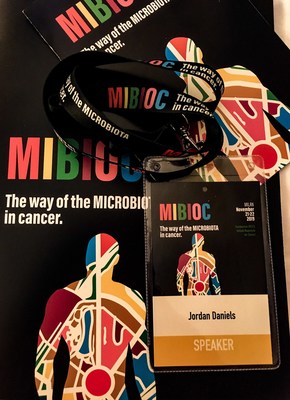Can Fecal Microbiota Transplant (FMT) Aid in Cancer Treatment?
|
MILAN and MALIBU, Calif., Nov. 21, 2019 /PRNewswire/ -- Progenabiome's Jordan Daniels is slated to present a Case Study of metastatic mesothelioma treated with Fecal Microbiota Transplant (FMT) as adjunctive therapy to Pembrolizumab.
For years, Progenabiome's CEO Dr. Sabine Hazan-Steinberg, has used FMT to treat patients with Clostridioides Difficile (C.diff) using a process to restore their microbiome. While FMT is a recognized treatment for Clostridioides difficile infection, Dr. Hazan-Steinberg investigates its potential applications in other fields where dysbiosis may be the culprit of disease. How does FMT apply to Cancer treatment? Tumors spread when cancer cells overcome the immune function of T-cells and spread throughout the body. Checkpoint inhibitors, a class of immunotherapy drugs, block the PD-1 pathway through which cancer cells bind to and subdue immune system cells. Checkpoint inhibitors are FDA-approved for several cancers, however, they remain investigational in mesothelioma treatment. One factor associated with non-response, is microbial dysbiosis. Dr. Hazan proposes that FMT can increase checkpoint inhibitors efficacy in cancer treatment. In 2018, under FDA supervision, Dr. Hazan utilized FMT and Pembrolizumab to treat a metastatic mesothelioma patient. The Case Report will be presented by Progenabiome's Jordan Daniels, at MIBIOC in Milan, Italy on Nov. 21-22, 2019. Microbiome Clinical Studies "We take clinical trials to the next level," says Dr. Hazan. "We are uniquely positioned to examine FMT in conjunction with standard treatments because we have a CAP and CLIA certified genetic sequencing lab and a clinical trial company - all in one place." Progenabiome currently investigates the role of the gut flora in various diseases through 21 studies with patented protocols overlooked by New England Independent Review Board® (NEIRB). Learn More About Microbial Therapies On March 28-29, 2020, Yinghong Wang, MD, PhD, MS from MD Anderson Cancer Center will present Implications of the Gut Microbiome in Cancer and Therapeutic Potential at the Malibu Microbiome Meeting (MMM) in Malibu, California. Other sessions will include: Microbiome 101, metagenomics, disease associations, research standards, FMT applications, therapeutics development, and more. MMM will be the first conference joining physicians, government and industry to discuss these topics. MMM speakers will include Doctors Thomas Borody (CDD, Australia), Neil Stollman (UCSF), Colleen Kelly (Brown), Paul Feuerstadt (Yale), Jessica Allegretti (Harvard), James Adams (Arizona), Faming Zhang (China), Sahil Khanna (Mayo Clinic), Alex Khoruts (Minnesota), Yinghong Wang (MD Anderson), Mazen Noureddin (Cedars-Sinai), Scott Jackson (NIST), Howard Young (NIH), Sabine Hazan (Progenabiome), and Zain Kassam (Finch). Progenabiome is a physician-owned and led genetic sequencing laboratory dedicated to understanding the clinical implications of the microbiome. Their Mission: to better understand, prevent, and treat diseases by analyzing specific genetic codes of 40 trillion gut microbes. For more: www.progenabiome.com / Twitter / Facebook / LinkedIn Contact: Stephanie Davis, 229760@email4pr.com
SOURCE Progenabiome |

